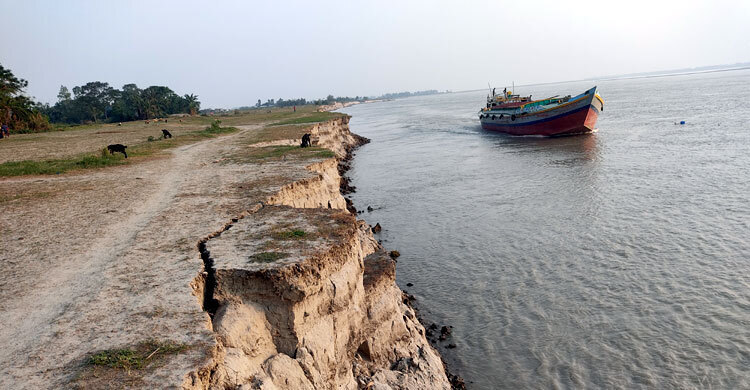Jamuna river erosion threatens 9 villages

Nine villages across three unions of Shahjadpur upazila in Sirajganj are on the verge of being washed away due to the continuous erosion by the Jamuna River. A significant portion of these villages—including croplands, homes, mosques, madrasas, and educational institutions—has already been engulfed by the river. Locals fear that without immediate intervention, entire villages may vanish at any moment.
Speaking to several residents on Wednesday (May 14), it was learned that although the erosion began about a month ago, it has intensified in recent days. The river has already devoured more than 50 homesteads and large stretches of populated areas. Many residents are dismantling their homes and relocating elsewhere for safety.
The worst-affected villages include Charthutia of Kaijuri Union; Makra, Dhitapur, Kursi, Baropakhia, Boro Chamtara, and Bantiar of Sonatoni Union; and Bri-Hatkora and Mohanpur of Gala Union.
Kalu Molla, a 70-year-old resident of Dhitapur village, said, “This year, we cultivated pointed gourd, eggplant, paddy, peanuts, black gram, melon, vegetables, and coriander on the char lands. Everything has gone under water. Since the erosion began in 1988, this is the 11th time it has struck us. In 2025, we’ve again lost our homes and croplands. Now, I’m worried—where will we go?”
Monowara Begum, 65, from the same village, added, “This is the 14th time I’ve had to abandon my home. Everything has been swallowed by the Jamuna.”

Rajina Khatun from Makra village in Sonatoni Union said, “This year, our sandy lands yielded crops like gold. But the erosion has taken everything into the river. These crops were our dream. Now, where will we go? What will we eat?”
Farmer Abdur Rahman noted, “In the past year alone, around 300 houses in five to six villages—from Sripur to Baropakhia in Sonatoni Union—have been washed away. Yet, the Water Development Board (BWDB) has taken no initiative to construct embankments to prevent erosion.”
Nazrul Islam of Kursi village said, “The Jamuna is erasing everything—our cattle market, mosque, madrasa, homes, and farmlands. If this erosion is not stopped, people will be left helpless.”
Shahjadpur Upazila Agriculture Officer Jerin Ahmed told Jago News that nearly 280 hectares of cropland across the three unions have been lost to the Jamuna over the past six years. “Farmers whose lands are now being eroded again are facing severe losses,” she added.
Shahjadpur Upazila Nirbahi Officer (UNO) Kamruzzaman said, “We will visit the affected areas, assess the damage, and consult with the Water Development Board to take necessary action.”

